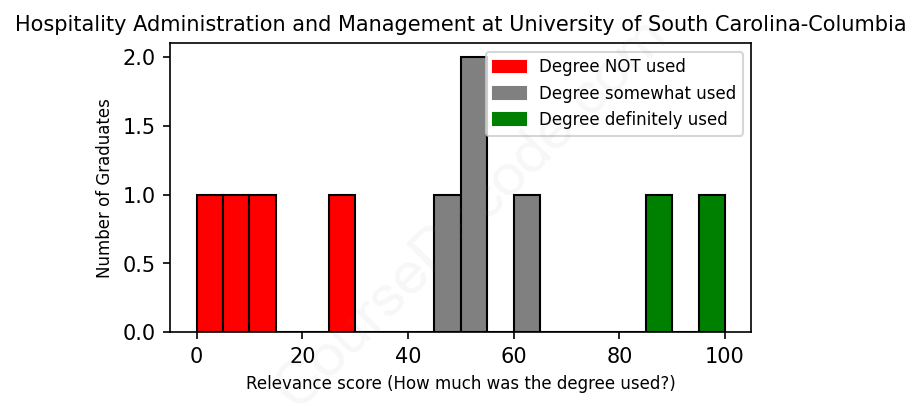
First, some facts. Of the Hospitality Administration and Management graduates from University of South Carolina-Columbia we've analyzed , here's how many have used (or NOT used) their degree in their career:

These are estimates based on AI analysis of 10 LinkedIn profiles (see below).
The verdict? Bad. Overall, with an average relevance score of 44%, Hospitality Administration and Management graduates from University of South Carolina-Columbia have a substantially lower likelihood (-23%) of finding work in this field compared to the average graduate across all fields:
And for comparison, here's the chart for all profiles we've looked at across all degrees.
Also, after graduating, only 10% of these graduates have pursued further education other than another Bachelor's degree (such as a Masters degree or other), compared to the average across all profiles of 35%. This suggests a Bachelors degree is enough for most Hospitality Administration and Management graduates, and it's normal to look for work straight after graduation.
See the details:
|
Relevance score: 95% We think this person has gone into a career highly relevant to their degree. We think this person has gone into a career highly relevant to their degree.
DEGREE INFOGraduated in 2017 from University of South Carolina-Columbia with a Bachelor's degree in Hospitality Administration and Management. No other secondary education since. JOB HISTORY SINCE GRADUATIONSales Associate Augusta National Golf Club Apr 2017 - Apr 2017 Cast Member  Walt Disney World Jun 2017 - Jan 2018 Communications Coordinator  American Executive Centers Feb 2018 - May 2018 Executive Administrative Assistant  American Executive Centers May 2018 - Jul 2018 Event Manager  Robertson's Flowers Jul 2018 - Present ABOUTNo information provided. |
The top 10 most common jobs done by the graduates we've analyzed (ranked most common to least) are:
Based on the LinkedIn profiles analyzed, the most common types of jobs held by graduates from the University of South Carolina-Columbia with a degree in Hospitality Administration and Management seem to lean heavily toward roles in customer service, sales, and event management. Positions like Account Manager, Sales Representative, and various managerial roles at hospitality establishments such as hotels and restaurants pop up often. While some of these jobs may touch on skills relevant to hospitality—like customer service or event planning—a lot of them don’t directly align with the core concepts of hospitality administration. Instead, they seem to drift towards areas like sales and general business management that don’t require specialized hospitality knowledge.
On the flip side, there are also notable positions such as Event Manager, Assistant General Manager, and roles directly related to hotel operations, which clearly draw on the skills learned in their degree program. However, many graduates seem to end up in roles where the connection to their hospitality studies feels more remote. For example, a significant portion of the jobs listed, like Account Manager in non-hospitality industries or administrative roles, don’t just stray from hospitality—they really don’t utilize the specific skills and knowledge from their education. So, while some have found roles that truly reflect their studies and allow them to use what they learned, many have found themselves in jobs that are less relevant to their degree.
Here is a visual representation of the most common words in job titles for Hospitality Administration and Management graduates (this is across all Hospitality Administration and Management graduates we've analyzed, not just those who went to University of South Carolina-Columbia):

Looking at the career trajectories of graduates from the University of South Carolina-Columbia's Hospitality Administration and Management program, it seems like there’s a mix of paths—some sticking quite closely to hospitality roles, while others veer into different fields. For many, their first job right out of college is often an entry-level position related to hospitality, such as bartending or working as a sales associate at a prominent venue like Augusta National Golf Club or Walt Disney World. However, there's also a noticeable trend of people landing roles in sales, client services, and administrative positions that may not directly align with traditional hospitality roles.
Fast forward about five to ten years, and while some graduates have moved up the ranks within hospitality—like those who transitioned from event specialists to senior managers at Marriott—others have shifted entirely into sectors like insurance, technology sales, or roles that involve financial services. It’s clear the degree provides a versatile foundation that allows graduates to pivot into various industries, even if they start in roles that seem unrelated to hospitality. So, while some might find themselves in impressive roles within the hospitality sector, others have carved out paths in sales and management in quite different fields. Overall, it’s a mixed bag—some grads are living the hospitality dream, while others are finding success in completely different arenas.
Honestly, a Bachelor’s degree in Hospitality Administration and Management can be a bit of a mixed bag when it comes to difficulty—it’s not typically considered one of the hardest degrees out there, but it definitely has its challenges! At the University of South Carolina-Columbia, you’ll find a blend of classes that cover everything from management principles to event planning and customer service, so there’s a fair amount of practical work involved. If you’re really passionate about hospitality and enjoy working with people, you might find it more fun than tough. But like any degree, if you don’t stay on top of your assignments and group projects, it could definitely get overwhelming. Overall, it strikes a decent balance—you’ll need to put in the effort, but it’s usually manageable for most students!
Most commonly, in the LinkedIn profiles we've looked at, it takes people 4 years to finish a Bachelor degree in Hospitality Administration and Management.
Looking at the careers of these hospitality grads from the University of South Carolina-Columbia, it seems like some have definitely found their way into decent money-making roles, while others might be working their way up the ladder. For example, the 2013 grad who jumped from bartender to senior management at Marriott shows how a career can really grow over time, likely leading to a solid salary. On the flip side, the 2010 grad who’s been self-employed and also held a temporary sales role might not be raking it in as consistently—it's hard to tell without numbers, but it sounds like a mixed bag overall. Sports and higher managerial roles seem to indicate good earnings for some, while others are still in those early career or less lucrative positions. So, yeah, it really varies depending on the path they chose!
Here is a visual representation of the most common words seen in the "about" section of LinkedIn profiles who have a Bachelor degree in Hospitality Administration and Management (this is across all Hospitality Administration and Management graduates we've analyzed, not just those who went to University of South Carolina-Columbia). This may or may not be useful:

Here are all colleges offering a Bachelor degree in Hospitality Administration and Management (ordered by the average relevance score of their Hospitality Administration and Management graduates, best to worst) where we have analyzed at least 10 of their graduates:
| College | Score | Count |
|---|---|---|
 Kendall College Kendall College
|
81 | 12 |
 University of Phoenix University of Phoenix
|
80 | 13 |
 Penn State University Penn State University
|
78 | 16 |
 University of South Carolina University of South Carolina
|
75 | 11 |
 University of North Texas University of North Texas
|
73 | 26 |
 Indiana University of Pennsylvania Indiana University of Pennsylvania
|
71 | 12 |
 University of Central Florida University of Central Florida
|
69 | 40 |
 University of Nevada-Las Vegas University of Nevada-Las Vegas
|
67 | 64 |
 CUNY New York City College of Technology CUNY New York City College of Technology
|
66 | 20 |
 Florida International University Florida International University
|
64 | 57 |
 California State Polytechnic University-Pomona California State Polytechnic University-Pomona
|
64 | 31 |
 University of Central Florida Rosen College of Hospitality Management University of Central Florida Rosen College of Hospitality Management
|
63 | 37 |
 Florida State University Florida State University
|
62 | 29 |
 Missouri State University Missouri State University
|
62 | 15 |
 James Madison University James Madison University
|
60 | 16 |
 Georgia State University Georgia State University
|
58 | 10 |
 State University of New York College at Buffalo State University of New York College at Buffalo
|
58 | 10 |
 The Ohio State University The Ohio State University
|
56 | 14 |
 Johnson & Wales University Johnson & Wales University
|
53 | 14 |
 Monroe College Monroe College
|
53 | 13 |
 East Carolina University East Carolina University
|
51 | 13 |
 University of Missouri-Columbia University of Missouri-Columbia
|
49 | 12 |
 University of South Carolina-Columbia University of South Carolina-Columbia
|
44 | 10 |
 University of Mississippi University of Mississippi
|
43 | 10 |